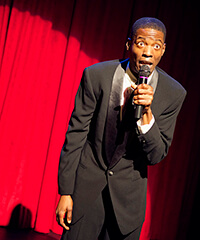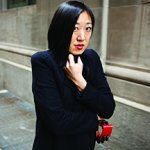Production of Young Jean Lee’s The Shipment – through October 15 – by Crowded Fire Theater at Potrero Hill’s Thick House marks only the third Bay Area staging of the work of the Brooklyn-based experimental dramatist the New York Times called “the most adventurous downtown playwright of her generation.” It was here, however, that Lee—a Korean-born woman raised in eastern Washington State, who earned a Bachelor of Arts in English from the University of California, Berkeley, and stayed on for graduate studies—first recognized her theatrical ambitions, when, in the midst of a “nervous breakdown” and a failing marriage, she gave up on her doctoral dissertation and realized during a therapy session that what she really wanted to do was write plays.

The provocative, playful art that Lee has generated since 2003 reflects a diverse body of concerns—racism, feminism, identity, and religion chief among them—and exemplifies a wide range of styles. As a writer and director, she’s put forth wordless performance art, solo monologues, acid satires, and musical collages. Throughout, however, the unhappy source of her artistic career—which has won her a Guggenheim Fellowship and two OBIE awards—has remained insistently, almost disturbingly, visible, like a pulsating wound: a grave mental anguish that Lee’s desperate, anxiety-prone characters tend to address directly, in expressionless language, thereby foreshortening the dramatic form in striking fashion. Where a conventionally structured naturalistic drama would supply emotional trajectories through plot, interaction, and implication, the emotions in Lee’s pieces are stuck in place, within her blunted monologues. Her characters don’t evolve; only the play itself does. The pain described by the characters seeps into the architecture of the drama like an infection. The closed-loop mental patterns of clinical depression are embodied as aesthetic disruptions.
When Lee’s plays appear to seek narrative coherence, they fragment and crumble, as in 2004’s The Appeal, a comically enfeebled imitation of Tom Stoppard’s Arcadia in which, reflecting an authorial belief that nobody could possibly truly care about the erudite brand of historical theater to which the play purports to belong, the crippled monologues and indistinct whining of the drama’s main characters, ostensibly the Romantic poets Coleridge and Wordsworth, finally depict only the playwright’s indifference, boredom, and procrastination. In 2010’s Lear, a rewrite of the Shakespearean tragedy that was the subject of Lee’s abandoned doctoral thesis, the actors eventually give up on their characters, reverting back to themselves and their personal concerns.
Other plays dispense with character and plot from the beginning, presenting themselves instead as audience-facing “theatrical events” that, rather than breaking the fourth wall, decline to erect one to start with: a self-help seminar, 2005’s Pullman, WA, an evangelical sermon, 2007’s Church, a mortality-focused TED Talk, 2011’s We’re Gonna Die. In most cases, these presentations—at first candid and engaging—gradually turn into wild hallucinogenic diatribes composed of imaginings – “a rainbow-colored balloon in the sky that is filled with jackrabbits” and “mermaid torsos planted like bushes all around” – that go nowhere and mean nothing. But the artfulness of Lee’s punkish anti-art is formidable, her work’s spiky parts carefully arranged to challenge theatergoers on issues of philosophical, psychological, and political significance.
The Shipment, which concerns the representation of African-Americans in media, begins as a startlingly vulgar standup comedy act before transitioning into a lobotomized iteration of Lorraine Hansberry’s social realism, with both segments hinging on black stereotypes. When the black actors finally enter a “normal” play populated by “normal” characters, the audience slowly comes to understand that this is possible only because the characters they’re now playing are, in fact, white. In a clever touch, the black players are transported into whiteness by a Modest Mouse song, as if it were a sorcerer’s spell.
In Songs of the Dragons Flying to Heaven, a quaint, intergenerational Asian-American identity play in the style of Amy Tan’s fiction is soured by the abrasive ranting of a young, “cute” Korean-American girl who describes “Asian parents” as “retarded monkeys who can barely speak English and who are too evil to understand anything besides conformity and status.” As if to posit an explanation for the oddly detached emotional self-assessments that typify Lee’s troubled characters – and which frequently recall the literalistic introspection of the Asian-American novelist Tao Lin – the girl claims that Asian-American children “try to learn how to be human from school or television, but the result is always tainted by this subtle or not so subtle retardation.”
But just as the nature of the girl’s supposed candor is called into question, the play is invaded by a self-absorbed, apolitical white couple that, amid romantic bickering, doesn’t even notice the Asian characters on stage. Lee redirects her focus onto the relationship problems of the white man and woman, casting her own interest in racial identity into doubt; or, then again, maybe not, depending on how you see it.
Lee’s self-subversions—for example, her blend of aggression and ambiguity—constitute the principal life-force of her drama. Her plays are both truer than conventional theater, in terms of the urgent frankness with which they speak to the self-consciousness and paralyzing hopelessness of the diseased mind, and less true: their narrative worlds, to the extent that they exist at all, are deliberately shoddy and two-dimensional, and even the most heartfelt sentiments of Lee’s characters are rendered dubious by the cheekily manipulated false realities in which they’re uttered.

Young Jean Lee’s plays are undeniably political, yet the playwright notes that “making art about political subjects doesn’t count as concrete action and is a form of masturbation-rage.” Her dramas simultaneously denounce racism and seem at times to defend it. They contain habitual warnings against the dangers of alcohol and caffeine, and directly exhort audience members to accept the Lord God Almighty into their lives, while admitting just as often that “nothing is good and there is no hope in anything.” Whether these contradictions describe the shape of artistic complexity or represent a frustrating avant-garde evasiveness is—like the myriad of other questions posed by Lee’s work—up to the theatergoer to decide upon, and that’s half the fun.


